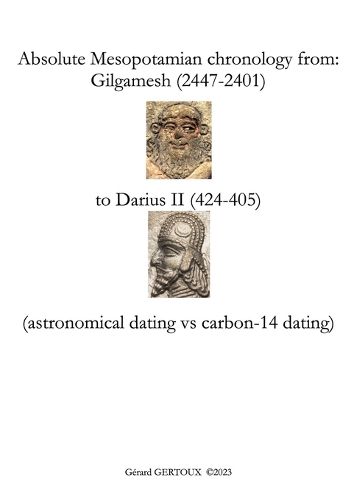Readings Newsletter
Become a Readings Member to make your shopping experience even easier.
Sign in or sign up for free!
You’re not far away from qualifying for FREE standard shipping within Australia
You’ve qualified for FREE standard shipping within Australia
The cart is loading…






This title is printed to order. This book may have been self-published. If so, we cannot guarantee the quality of the content. In the main most books will have gone through the editing process however some may not. We therefore suggest that you be aware of this before ordering this book. If in doubt check either the author or publisher’s details as we are unable to accept any returns unless they are faulty. Please contact us if you have any questions.
The Egyptian king lists were commissioned, as early as the first dynasty, by kings wishing to legitimise their royal descent from Narmer (2838-2808), the founder of the Egyptian empire. On the other hand, Sumerian king lists were commissioned by Shulgi (2002-1954), a powerful king of Ur III in the last Sumerian dynasty, who presented himself as the heir of the famous Gilgamesh (2447-2401), attributing to him the role of founder of the Sumerian empire, even though Gilgamesh, king of Uruk, knew that his city had been founded by EN AMAR.UTU (c.3000-2950), called Bel Marduk by the Babylonians. What's more, he also knew from the Akkadian governor of Babel (a word meaning "Gate of God" in Hebrew, later translated into Sumerian as KA.DINGIR.RA) that Marduk had built a temple next to the gigantic four-storey ziggurat, called E.TEMEN.AN.KI ("temple of the foundation of the sky/heavens and the earth") by the Sumerians, the famous Tower of Babel. The Sumerian king lists therefore completely obscured the role of Babylon's founder Marduk, a powerful hunter called Nimrod ("we will rebel") in the Bible (Gn 10:9-10), in order to conceal the collapse of his empire, referred to by archaeologists as the "Uruk expansion" (c.2950-2900). The Akkadian scribes of Shulgi, informed by some descendants of Noah (ZI.U4.SUD.RA "life of prolonged days" in Sumerian) living in Ur (like Abraham's family), traced the beginning of the mythical unified Sumerian kingship back to the 10th and last antediluvian king of Shuruppak, the famous survivor of the universal flood, named Ziusudra, or Noah, who lived 350 years after the universal flood (Gn 9:28), in 3170 BCE (LXX), and died in 2820 BCE, the beginning of the first Sumerian dynasty (Kish I). Marduk's role did not reappear until Hammurabi (1657-1654), who chose to glorify his capital "Babylon the Great" (Dn 4:30; Rv 17:18; 14:8), dedicating it to its founder: the Lord (Bel) Marduk (Jr 50:2), the powerful hunter whom the Sumerians had originally represented as the "Master of the Animals" clasping two lions in his arms. So, history did indeed begin at Sumer, but only the biblical text explains the role of its founder (Marduk).
$9.00 standard shipping within Australia
FREE standard shipping within Australia for orders over $100.00
Express & International shipping calculated at checkout
This title is printed to order. This book may have been self-published. If so, we cannot guarantee the quality of the content. In the main most books will have gone through the editing process however some may not. We therefore suggest that you be aware of this before ordering this book. If in doubt check either the author or publisher’s details as we are unable to accept any returns unless they are faulty. Please contact us if you have any questions.
The Egyptian king lists were commissioned, as early as the first dynasty, by kings wishing to legitimise their royal descent from Narmer (2838-2808), the founder of the Egyptian empire. On the other hand, Sumerian king lists were commissioned by Shulgi (2002-1954), a powerful king of Ur III in the last Sumerian dynasty, who presented himself as the heir of the famous Gilgamesh (2447-2401), attributing to him the role of founder of the Sumerian empire, even though Gilgamesh, king of Uruk, knew that his city had been founded by EN AMAR.UTU (c.3000-2950), called Bel Marduk by the Babylonians. What's more, he also knew from the Akkadian governor of Babel (a word meaning "Gate of God" in Hebrew, later translated into Sumerian as KA.DINGIR.RA) that Marduk had built a temple next to the gigantic four-storey ziggurat, called E.TEMEN.AN.KI ("temple of the foundation of the sky/heavens and the earth") by the Sumerians, the famous Tower of Babel. The Sumerian king lists therefore completely obscured the role of Babylon's founder Marduk, a powerful hunter called Nimrod ("we will rebel") in the Bible (Gn 10:9-10), in order to conceal the collapse of his empire, referred to by archaeologists as the "Uruk expansion" (c.2950-2900). The Akkadian scribes of Shulgi, informed by some descendants of Noah (ZI.U4.SUD.RA "life of prolonged days" in Sumerian) living in Ur (like Abraham's family), traced the beginning of the mythical unified Sumerian kingship back to the 10th and last antediluvian king of Shuruppak, the famous survivor of the universal flood, named Ziusudra, or Noah, who lived 350 years after the universal flood (Gn 9:28), in 3170 BCE (LXX), and died in 2820 BCE, the beginning of the first Sumerian dynasty (Kish I). Marduk's role did not reappear until Hammurabi (1657-1654), who chose to glorify his capital "Babylon the Great" (Dn 4:30; Rv 17:18; 14:8), dedicating it to its founder: the Lord (Bel) Marduk (Jr 50:2), the powerful hunter whom the Sumerians had originally represented as the "Master of the Animals" clasping two lions in his arms. So, history did indeed begin at Sumer, but only the biblical text explains the role of its founder (Marduk).